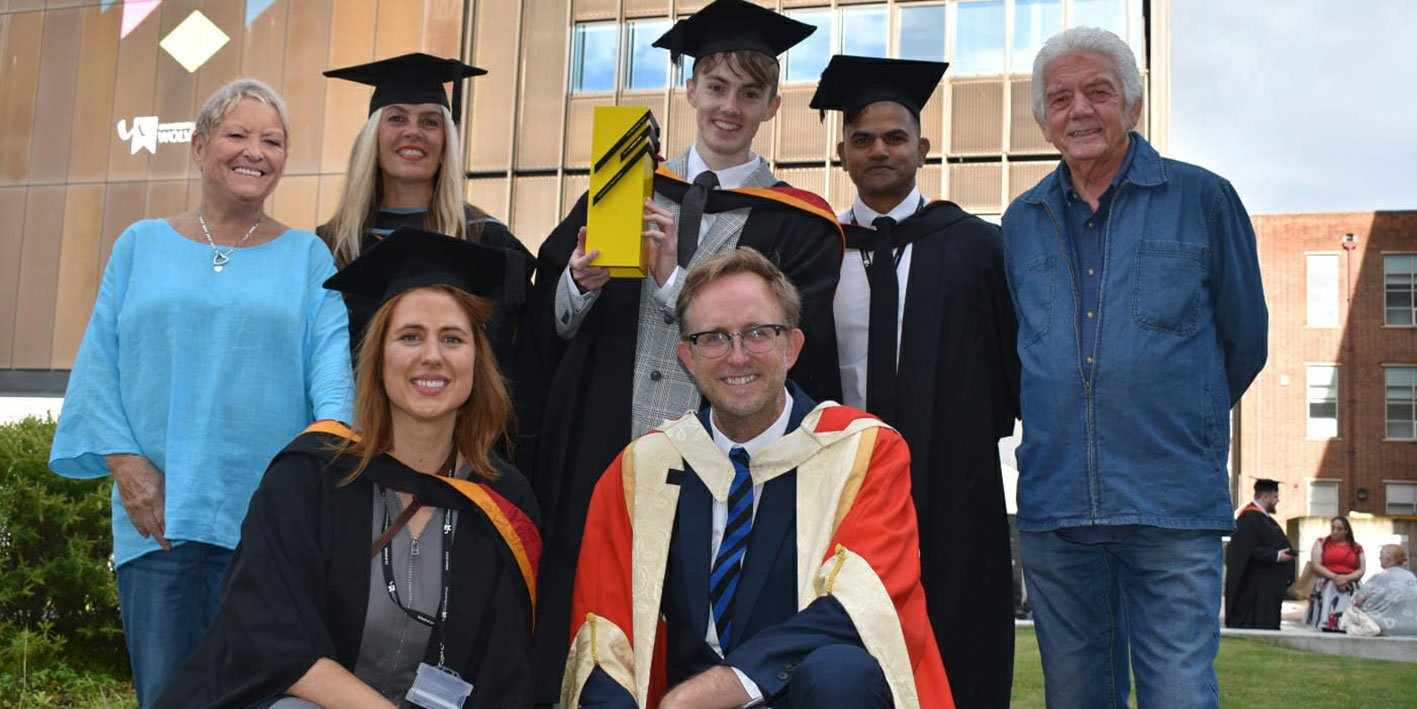
Stephen Fry offers novel support for pilot prison research project
-Elliott-Spencer.jpg)
The University of Wolverhampton’s Big Bookshare research project has received a major boost after writer, actor and broadcaster, Stephen Fry, offered novel support for the pilot prison venture.
The Big Bookshare project is an Arts Council England funded follow-on of Novel Perceptions, a research project investigating unconscious biases in the reading preferences of the British population. The Big Bookshare invites prisoners in four Kent prisons to read and discuss novels as well as taking part in creative writing workshops.
The project aims to boost literacy and wellbeing amongst prisoners by finding new ways to stimulate reading in prisons.
Researchers in the School of Humanities at the University of Wolverhampton recently secured £20,000 funding for the pilot impact project that will benefit prison inmates. The Big Bookshare is a pilot project and will take place in four prisons in Kent - HMP Swaleside, HMP Elmley, HMP Maidstone and HMP East Sutton.
Fry, who spent three months in Pucklechurch Remand Centre, confirmed his participation in the Big Bookshare. In HMP Swaleside and HMP Elmley, inmates will be invited to read Heroes, Fry’s modern retelling of classical Greek myths.
He said: “As an ex-prisoner myself I know the value of books and reading on the inside. TV is all very well but nothing takes the mind, soul and spirit outside the walls so much as a book. Prison life is often noisy, crowded and loud – reading provides creative privacy, a kind of solitary non-confinement where you can visit other worlds, live other lives and find solace and reward.
“I hope that people taking part in the project will, first and foremost, appreciate the pleasure of truly magnificent stories and also recognise the fallibility of true heroes, the pressure they are under and the mistakes they make. Not one of the Greek Heroes is perfect and without flaws. Fate and failure dog them, but they win through.”
One of the other books chosen for the HMP East Sutton Park is British/Irish writer and University of Wolverhampton Honorary Graduate, Kit de Waal’s international bestselling novel, My Name is Leon, a heart-breaking story about an adopted boy who deals with life in foster care. De Waal, who herself adopted two children, has recorded a video for the project in which she discusses her story, including her experience of the care system in Britain.
Leader of the Big Bookshare project, Professor in English Literature at the University, Sebastian Groes, said: “We’re absolutely delighted to work with Stephen and Kit. It’s wonderful that two such eminent and well-loved writers are willing to give their time and energy to inspire readers of all kinds re-enforces our belief that literature can bring benefit to everyone.”
Novel Perceptions received £300,000 from the Arts & Humanities Research Council in 2020 and is the flagship research project of the Centre for Transnational and Transcultural Research (CTTR) and School of Humanities at the University of Wolverhampton.
Bas said: “After doing public engagement work for 18 months, we have gathered over 25,000 respondents to our Big Book Review survey and the team is now moving to the next stage: the analysis of our data using sociological, psychological and computational methods.
“The Big Bookshare is a new engagement project that aims to disseminate Novel Perceptions research in UK prisons with a view to creating impact by increasing the volume and diversity of reading in prisons, encouraging prisoners to share and discuss recommendations which will boost literacy, improve wellbeing and foster communities where prisoners feel confident accessing a range of cultural experiences.”
Victoria Barnett, Prison Library Development Manager at the four Kent prisons, who is working with the research team on the project, said: “Learnings from this project will help our team of prison librarians plan and run cultural activities that engage prison communities. Prison librarians are currently facing particular challenges due to prison staffing shortages, which make it hard for prisoners to access physical prison libraries.
“One key priority of this pilot is to find ways to engage prisoners in literary and cultural activities throughout the prison, and to explore ways of using digital technology to run engagement activities. The ultimate goal is to impact on the prisoners’ self-perception and to change their thinking about the world. In the evaluation phase of our project, we will ensure that learnings are shared among prison librarians at other institutions through the The Chartered Institute of Library and Information Professionals Prison Libraries Group, and through the wider CILIP network. In HMP Swaleside, we plan to make extensive use of the Prisoner intranet.
“These facilities are currently being tested and the project will provide additional data on the benefits that they can provide to inmates. Demonstrating beneficial applications of these technologies will help make a case for rolling them out in other institutions.”
The mass book club will see 1,000 prisoners reading a novel that will be chosen with the help of psychological and sociological research, aided by computational methodology. Creative and Professional Writing Lecturer at the University, Dr Rob Francis, will help design creative writing exercises for the prisoners and organise workshops which will run alongside videos, podcasts and promotional material.
Find out more about the University's research in the University’s eZene, Research Matters - showcasing our research successes and news from the sector.
For more information about courses in the School of Humanities, check out the University website or register for one of our forthcoming Open Days.
Picture credit: Elliott Spencer
ENDS
For more information please contact the Corporate Communications Team.


/prod01/wlvacuk/media/departments/digital-content-and-communications/images-2024/240328-Varsity-Line-Up-Resized.jpg)
/prod01/wlvacuk/media/departments/digital-content-and-communications/images-18-19/220325-Engineers_teach_thumbail.jpg)
/prod01/wlvacuk/media/departments/digital-content-and-communications/images-2024/240515-Spencer-Jones-Award-Resized.jpg)
/prod01/wlvacuk/media/departments/digital-content-and-communications/images-2024/240320-Uzbekistan-Resized.jpg)
/prod01/wlvacuk/media/departments/digital-content-and-communications/images-2024/240229-The-Link-Resized.jpg)
/prod01/wlvacuk/media/departments/digital-content-and-communications/images-2024/240516-Andy-Gibson-Resized.jpg)

